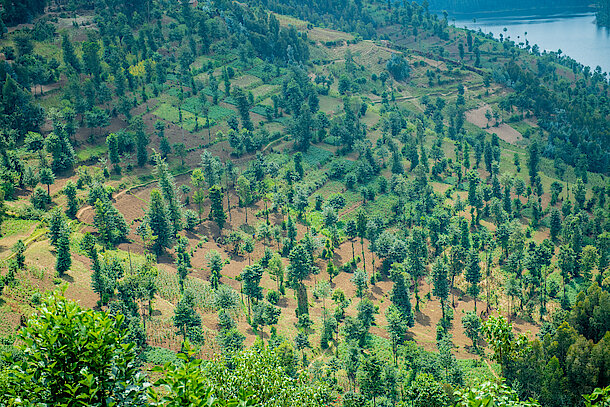
Climate change poses significant challenges to Rwanda’s environment, economy, and communities. As a country heavily reliant on agriculture, forestry, and tourism, Rwanda is particularly vulnerable to the impacts of climate change, such as erratic rainfall, floods, and droughts[1]. Adapting to these changes is crucial for ensuring a sustainable and resilient future for Rwanda.
The Importance of Climate Change Adaptation
1. Protecting Livelihoods and Food Security
Over two-thirds of Rwanda’s population depends on agriculture for their livelihood[1]. Climate change threatens crop yields and food security through unpredictable weather patterns and extreme events. By adopting sustainable agricultural practices, such as rainwater harvesting and drought-resistant crops, Rwanda can help farmers maintain productivity and secure their livelihoods[2].
2. Enhancing Resilience to Extreme Weather Events
Rwanda has experienced an increase in the frequency and intensity of extreme weather events, including floods and landslides[1]. Implementing climate-smart technologies, such as efficient irrigation systems and early warning systems, can help communities better prepare for and respond to these events, reducing their vulnerability and enhancing resilience[2].
3. Preserving Natural Resources
Rwanda’s natural resources, including its forests and water bodies, are under threat from climate change[1]. Environmental protection initiatives, such as reforestation and waste management, are essential for preserving these resources and ensuring they continue to provide vital ecosystem services[2].
4. Supporting Economic Growth and Development
Climate change adaptation is also critical for Rwanda’s economic growth and development. By investing in sustainable practices and technologies, Rwanda can create green jobs, attract investment, and build a more resilient economy[1].
RODI’s Approach to Climate Change Adaptation
At the Rwanda Organization for Development Initiatives (RODI), we are committed to supporting Rwandan communities in developing sustainable solutions for a changing climate. Our main programs focus on:
- Sustainable Agriculture: We promote rainwater harvesting, drought-resistant crops, and soil conservation techniques to help farmers maintain productivity even during periods of erratic rainfall.
- Climate-Smart Technologies: We introduce and train communities on climate-smart technologies, such as efficient irrigation systems and early warning systems for extreme weather events.
- Environmental Protection: We advocate for practices that protect Rwanda’s natural resources, including promoting reforestation, reducing deforestation, and encouraging waste management initiatives.
Through our partnerships with local and international organizations, we work to build a resilient and sustainable future for Rwanda. By addressing the challenges posed by climate change, we aim to improve the quality of life for all Rwandans and ensure the long-term health of our environment.
Conclusion
Climate change adaptation is vital for Rwanda’s future. By protecting livelihoods, enhancing resilience, preserving natural resources, and supporting economic growth, Rwanda can build a sustainable and resilient future. Organizations like RODI play a crucial role in this effort, working with communities to develop and implement effective adaptation strategies.
References
[1] Rwanda Environment Management Authority (REMA): Climate Change: https://www.rema.gov.rw/our-work/climate-change
[2] CCP: Climate Change in Rwanda: Impacts, Strategies, and Solutions: https://climatechange.gov.rw/knowledge/training/climate-change-in-rwanda-impacts-strategies-and-solutions
[3] Rwanda’s Climate Adaptation Monitoring, Evaluation, and Learning: https://napglobalnetwork.org/wp-content/uploads/2023/05/napgn-en-2023-brief-1-rwanda-mel-agriculture-final.pdf
[4] Rwanda Announces Ambitious Climate Action Plan – Environment: https://www.environment.gov.rw/news-detail/rwanda-announces-ambitious-climate-action-plan
[5] Rwanda’s Climate Adaptation Monitoring, Evaluation, and Learning: https://napglobalnetwork.org/wp-content/uploads/2024/10/rwanda-mel-technical-report-v4.pdf
[6] Rwanda launches economy-wide project to advance climate adaptation planning: https://www.environment.gov.rw/news-detail/rwanda-launches-economy-wide-project-to-advance-climate-adaptation-planning

